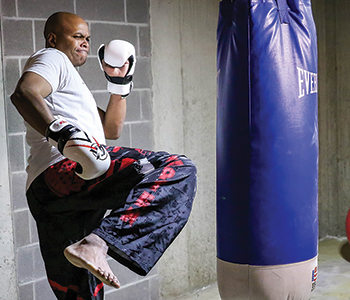
When Ray Demes began urinating every two hours each day, he knew he needed to seek medical attention. He would learn the cause was benign prostatic hyperplasia (BPH). In this condition, the prostate grows, putting pressure on the urethra and obstructing urine flow.
The prostate gland, which produces semen, is located below the bladder and surrounds the urethra, which is the tube that carries urine out of the body. In addition to frequent urination, men also can experience a slow stream and incomplete emptying.
As a man ages, his prostate enlarges, and each year about 350,000 men with BPH need treatment. Ray ultimately would undergo aquablation therapy, a new FDA-approved treatment. North Kansas City Hospital is the only hospital in Missouri and Kansas and among the first in the U.S. to offer aquablation to treat BPH. The technique, which has low complication rates, provides long-lasting relief by reducing the pressure with imaging, robotics and a heat-free water jet.
“Before my aquablation, I was rushing to restrooms and getting up four to five times at night,” said Ray, who lives in Overland Park, KS. “Because I didn’t have much warning, I made sure if I was out that I knew where the closest bathroom was located. My aquablation set my clock back to my 40s — to when I didn’t think about finding a restroom.”
Sound Alternative
Ray’s issues brought him to Kansas City Urology Care (KCUC) in 2015, but by 2022 he was ready to step away from taking medications for treatment. They work to lower prostate-specific antigen (PSA) levels and help alleviate symptoms, but his PSA levels remained above the normal range for his age. “I also felt my symptoms had worsened, and, moreover, I wanted long-term relief,” Ray said.
Health Expert

Imaging and other tests ruled out prostate cancer, but other tests showed Ray’s BPH was severe due to its very large size. Additionally, his prostate was beginning to cause bladder trabeculation, which is when the bladder walls thicken. “It was mild, but Ray was facing chronic bladder retention and dependence on a catheter if he didn’t treat his BPH,” said Gerald Park, MD, Ray’s urologist with KCUC.
Dr. Park performed Ray’s aquablation in November 2022. “Aquablation is a sound alternative for men who have not found relief with medications,” Dr. Park said. “While medications relax and shrink the prostate, they also may decrease blood pressure and interfere with the prostate’s sexual functions. In addition to resolving symptoms of a hesitant, weak or dribbling urine stream, the need to get up at night to urinate, and an inability to completely void, aquablation preserves the part of the prostate that controls sexual function.”
This is because as the prostate gets bigger, it begins to cause issues with achieving an erection. “Prior to aquablation, patients would undergo medical and surgical treatments that would alleviate the urinary obstructing part of the prostate, but they would severely impact the sexual function of the prostate,” Dr. Park said. “Although Ray’s enlarged prostate did not affect his sexual function, those with sexual dysfunction can know we can treat prostates with aquablation without diminishing their ability to obtain an erection or to ejaculate.”
Water + Tissue Removal

As the name implies, aquablation combines water and removal of tissue. During the approximately 10-minute minimally invasive procedure, Dr. Park uses ultrasound imaging to create a detailed map of the prostate and surrounding area. The map then guides a robotic system, controlled by Dr. Park, to remove the enlarged portions of the prostate with a high-velocity water jet.
After an overnight stay in the hospital, the patient returns home on a catheter, which allows for urination while the urethra heals. Ray’s catheter was removed three days later in Dr. Park’s office.
Side effects include mild pain, difficulty when urinating and blood in the urine, which should subside within a few days, but Ray began having blood in his urine nearly three weeks later. “It extended my recovery because I went to the ER, where they replaced my catheter and kept me overnight in the hospital. I didn’t have a lot of stress or frustration because I was well-informed by Dr. Park and his nurses, Holly and Brenda, who I cannot say enough good things about.”
A week later, his catheter was removed in Dr. Park’s office, and by Jan. 5 Ray was back fulfilling he passion — fitness. “I’m going to the gym and walking 10,000-15,000 steps every day, doing karate twice a week and playing golf,” Ray said. “I also no longer need to stop drinking water at 5 o’clock, and I’m sleeping more at night. My life is 100% back to normal, and I could not have done this without the support of my girlfriend, Linda.”
Appreciation
Ray possesses a combination of strength, great humor and appreciation that brings anyone who meets him into his graces. Those characteristics show why he was so taken by the care he received at NKCH.
“The staff on the 5th floor where I went after my surgery not only took care of me, but also Linda. They were fantastic,” Ray said. “They deserve a billboard recognizing their phenomenal care. I got the same level of care when I went from the ER to the 8th floor. Beyond the amazing people, an incredible group of leaders has created a culture of caring. It permeates through every room, every floor and every caregiver.”